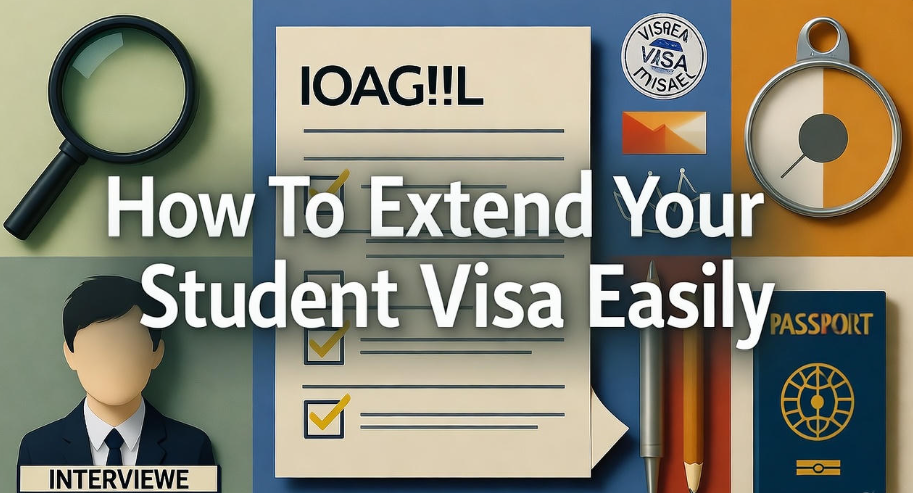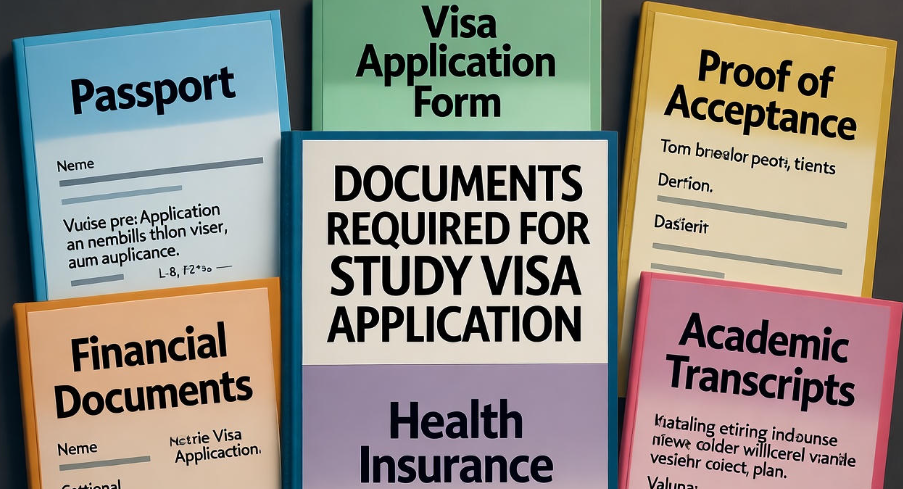Studying abroad is one of the most exciting experiences in life — new culture, new people, new goals! But what happens when your visa is about to expire and your degree or research isn’t finished yet? Don’t panic. Extending your student visa is a normal process, and with the right steps, you can do it smoothly and stress-free.
This guide will explain how to extend your student visa easily in the most practical, simple, and human-friendly way possible. You’ll also get real tips, example answers, and even a few helpful tables to make it all crystal clear.
Understand Why You Need a Visa Extension
The first step is to clearly understand why you’re applying for a visa extension. Immigration officers usually need a valid reason before approving an extension request. Some common reasons include:
✅ You still have semesters or research left in your program.
✅ Your thesis or final exams are delayed.
✅ You’ve switched to a new program or added a major.
✅ You’re required to complete internships or practical training.
If your reason makes sense and your documents support it, your extension will likely be approved.
Start Early — Don’t Wait Until the Last Minute ⏰
Many students make the mistake of waiting until their visa is just about to expire. That’s risky. Ideally, you should apply for a visa extension at least 1–3 months before your current visa expires.
Applying early gives you time to fix any issues — like missing documents or incorrect information — and ensures you don’t overstay, which can cause serious trouble with immigration.
Here’s a quick look at recommended timing for visa extension:
| Country | Recommended Time Before Expiry | Processing Time (Average) |
|---|---|---|
| USA | 90 days | 4–8 weeks |
| UK | 3 months | 6–12 weeks |
| Canada | 90 days | 6–8 weeks |
| Australia | 3 months | 4–10 weeks |
| Germany | 6–8 weeks | 4–6 weeks |
Collect the Right Documents
Before you submit your application, you need to gather the required documents. Missing even one small paper can cause a delay or rejection. Here’s a general checklist (note that requirements may vary depending on the country):
Valid passport (with at least six months validity)
Current student visa copy
Proof of enrollment or letter from your university confirming you’re still studying
Academic transcripts or attendance records
Financial proof (bank statements, scholarship letter, or sponsor guarantee)
Health insurance (if required)
Proof of accommodation
Updated photos (passport size)
Keep everything in a folder, clearly labeled. Organized documents show professionalism — and visa officers appreciate that.
Apply Through the Correct Channel
Every country has a specific process. Some use online portals, while others require you to visit immigration offices.
For example:
-
In Canada, students apply online through the IRCC portal.
-
In Australia, applications go through the Department of Home Affairs website.
-
In the UK, you use the Gov.uk visa extension service.
-
In the USA, you need to apply through your DSO (Designated School Official) using Form I-539.
If you’re unsure where to apply, ask your international student office — they deal with these things all the time and can guide you step-by-step.
Explain Your Reason Clearly and Honestly
When you write your visa extension statement or cover letter, be clear and honest. Don’t over-explain or make excuses — just state facts.
Here’s a simple example:
“I am requesting an extension of my student visa because my research project in environmental science has been extended by four months due to lab delays. My university has confirmed my continued enrollment until June 2026.”
Honesty goes a long way. Immigration officers are trained to spot unnecessary or false statements.
Show That You Can Support Yourself Financially
Money is a major factor in visa extensions. You must prove that you can pay your tuition and living expenses during the extended stay.
You can show this through:
-
Recent bank statements
-
A sponsorship letter from your parents or guardian
-
A scholarship confirmation
-
Your part-time job income proof, if allowed by visa rules
Here’s a simple financial example:
| Type of Expense | Monthly Estimate | For 6-Month Extension |
|---|---|---|
| Rent & Utilities | $700 | $4,200 |
| Food | $300 | $1,800 |
| Transportation | $150 | $900 |
| Miscellaneous | $200 | $1,200 |
| Total | $1,350/month | $8,100 total |
Make sure your bank balance covers these costs comfortably.
Check Your Health Insurance and Medical Requirements
Some countries, like Australia and Germany, require you to maintain valid health insurance for the entire period of your stay. If your visa is being extended by six months or more, you may need to renew your health insurance policy too.
For example, if your insurance expires in June but your new visa is until December, update your insurance before submitting your extension.
Pay the Required Fee
Every visa extension involves a small processing fee. Always pay through the official government website or the embassy’s portal. Avoid middlemen or “agents” who promise faster processing — that’s often a scam.
Here’s a general idea of visa extension fees:
| Country | Visa Extension Fee |
|---|---|
| USA | $370 + biometrics fee |
| UK | £490 |
| Canada | CAD 150 |
| Australia | AUD 710 |
| Germany | €100 |
Keep your payment receipt — it’s proof that you applied correctly.
Avoid Common Mistakes
Here are a few things you should not do during the visa extension process:
❌ Submitting incomplete documents
❌ Forgetting to renew your passport
❌ Applying too late
❌ Ignoring emails from immigration
❌ Giving false financial or academic information
Small mistakes can delay approval for weeks. Double-check everything before clicking “submit.”
Stay Legal While Waiting for a Decision
If your current visa expires while your extension is being processed, don’t worry — most countries automatically allow you to stay legally until a decision is made (as long as you applied before expiry).
However, you can’t travel internationally during this period, as re-entry might not be allowed until your new visa is approved.
Follow Up and Stay Updated
After submission, regularly check your email or online portal for updates. Sometimes immigration may ask for an additional document or clarification. Respond quickly and politely.
If there’s an unusual delay, you can contact the visa office through official communication channels — never through social media or unofficial numbers.
What Happens If Your Extension Is Denied?
If your extension is rejected, you’ll receive a letter explaining why. Common reasons include:
-
Insufficient funds
-
Invalid documents
-
Poor academic progress
-
Late application
You may still have options:
-
Appeal the decision (if the country allows it).
-
Reapply with corrected information.
-
Seek help from your university’s international student office.
Some Practical Tips to Make the Process Easier
Keep copies of everything — both digital and printed.
Ask your university to issue updated enrollment letters early.
Track your application online.
Use simple language when filling forms — avoid slang.
Always apply directly through official government websites.

Quick Overview Table — Student Visa Extension Steps
| Step | Action | Important Tip |
|---|---|---|
| 1 | Check eligibility | Confirm program duration and visa expiry date |
| 2 | Gather documents | Include financial, academic, and ID proof |
| 3 | Apply early | At least 1–3 months before expiry |
| 4 | Submit online or at office | Use official portal only |
| 5 | Pay the fee | Keep digital and printed receipt |
| 6 | Wait for decision | Don’t travel during processing |
| 7 | Get new visa | Keep both old and new visa copies |
Real-Life Example
Let’s say a student named Ayesha is studying in Canada and her visa expires in April 2026. Her final project gets delayed until August. She contacts her university in February and gets a new letter confirming her enrollment till August. She then applies for an extension through IRCC in March, uploads her financial documents and pays the fee.
Result? Her visa extension is approved within six weeks, and she continues her studies peacefully without any legal issues.
That’s how planning ahead makes things easy.
FAQs — Frequently Asked Questions
Q1: How early can I apply for a student visa extension?
You can apply up to 3 months before your current visa expires. It’s best not to wait until the last month.
Q2: Can I travel while my visa extension is in process?
Usually no. If you leave the country, your extension request might be canceled automatically. Stay until you get a decision.
Q3: What if I don’t have enough money to show for the visa extension?
You can use a sponsor letter, scholarship proof, or a university support document showing they’ll fund you temporarily.
Q4: Will my visa extension affect my part-time job permission?
Not at all. Once your visa is extended, your part-time work rights continue as before — just follow your country’s working hours limit.
Q5: What happens if I forget to apply before expiry?
That can be serious. You might become an “overstayer,” which can harm your immigration record. Apply immediately and contact immigration support for advice.
Final Words
Extending your student visa isn’t as stressful as it sounds. The key is to plan ahead, stay honest, and keep your documents ready. Every year, thousands of students extend their visas successfully — and you can too.
Think of it as just another step in your study abroad journey. Stay calm, stay informed, and before you know it, you’ll have your new visa and can continue your academic dream without worry.
✨ So, get started today — your future deserves the effort!




